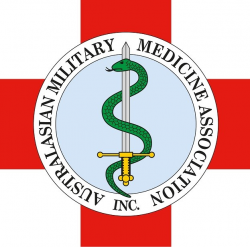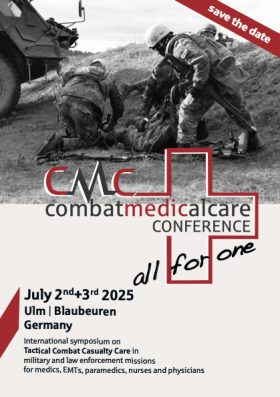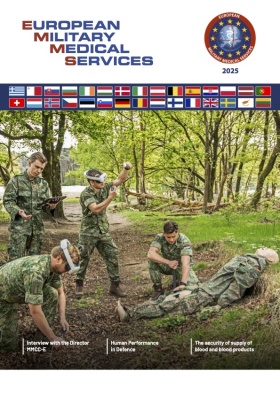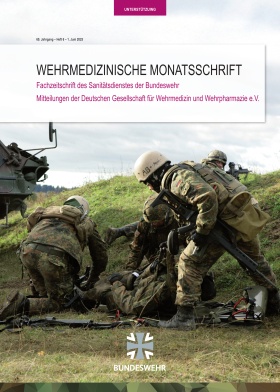
Article: Simon Höpfl
The Bundeswehr Medical Academy
As the central facility for Bundeswehr medical training, the coordination centre for military medical research and development in the armed forces as well as the internationally renowned interagency competence centre for CBRN medical defence, the Medical Academy with its broad spectrum of tasks and capabilities is a rather unique agency within the Bundeswehr, located at Ernst von Bergmann Barracks in the north of Munich. This institution plays an essential role in the mission accomplishment of the Medical Service: Almost all members of this major organisational element spend part of their term of service at the headquarters of the Bundeswehr Medical Service for their basic, advanced and follow-on training. The Training and Instruction Directorate and the Directorate of Military Medical Science and Capability Development are the two pillars of the Academy. In addition, the three ministerial research institutes for CBRN medical defence are subordinate to the Medical Academy: the Institute of Radiobiology, the Institute of Microbiology and the Institute of Pharmacology and Toxicology. The guiding principle of the structure adopted in 2013 is the aspiration to ensure that this place of research and development should also be the place where training is planned and designed and where a major part of medical training takes place. This makes it possible to implement the latest findings from military operations, science and capability analysis in the conception and conduct of instruction and training and put them into practice.
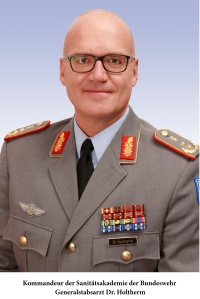
Commandant of the Bundeswehr Medical Academy:
Major General (MC) Dr. Holtherm.
From Pépinière to Academy

The roots of today’s Medical Academy go back to the 200-year-old tradition of the Pépinière. Military physicians were trained for their service in the armed forces in this former educational establishment of the Kingdom of Prussia from 1795 onwards. The “Army Medical Service School”, which was founded about 150 years later in 1956, was the first comparable institution of this kind in today’s Bundeswehr. On 29 October 1963, the school was given the name of “Academy of the Bundeswehr Medical and Health Service” as a result of the ambitious and successful research conducted at the Institutes of Radiobiology, Microbiology and Pharmacology and Toxicology, which were still part of the Studies and Science Department at that time. After decades of the associated departments being located at up to six different places in and around Munich, the withdrawal of the American forces in 1968 provided the opportunity to combine them at one single site. Planning was finished in 1973 and after a construction period of seven years, the Academy has been located at the Ernst von Bergmann Barracks since 1980. In 1997, it was eventually renamed “Bundeswehr Medical Academy”. With the dissolution of the former Munich Medical Office at the end of 2013, the now independent institutes were placed under the command of the Medical Academy in a final step, thus adopting the structure that still applies today.
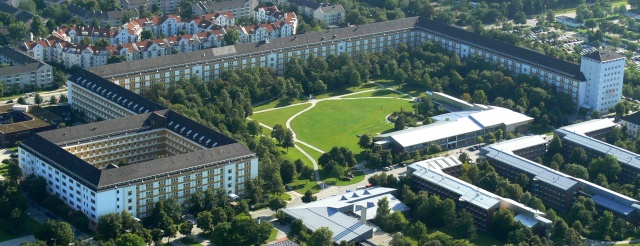
The Ernst-von-Bergmann barracks
Training and Instruction
Regardless of the historical development of today’s Medical Academy, the core task of the institution has always remained and will always remain the same: training junior medical personnel of the Bundeswehr. The Health Care Training and Instruction Directorate is responsible for conducting up to 130 different types of training in around 460 training courses with around 10,000 participants every year. As a school for officers and noncommissioned officers of the Medical Service, career training of junior personnel is an essential part of the Medical Academy’s training course system. Baseline training, marksmanship training, training field: During their time in Munich, future Medical Service officers and senior NCOs will learn the necessary skills to succeed in their future military functions, such as basic system knowledge, foreign languages and tactical combat casualty care. In addition to the basic military training required for every career, the Medical Academy provides a wide range of advanced and follow-on training opportunities in all areas of the medical services. Medical devices training, licensure- or specialty-specific training such as advanced veterinary training or follow-on training particularly in the fields of rescue medicine and emergency surgery are just some examples of the diverse courses offered at the Academy. The staff at the Academy do not only train prospective Bundeswehr personnel. As part of bilateral exchange programmes, they also conduct training courses with partner nations from all around the world, which are highly regarded in an international environment and will be increasingly offered in the future. In addition to actually conducting the training courses, the Directorate is also responsible for carrying out the relevant policy work, planning, evaluation and follow-up measures. From the conception and arrangement of a training course to the preparation of an overview of all courses and the planning of the relevant infrastructure and personnel resources up to the evaluation in the context of quality and innovation management, all sub-processes required for a successful implementation of the training mission are carried out under a unified command. Pooling the management and implementation of training in a single organisational unit and having additional interrelations with the departments of the Directorate of Military Medical Science and Capability Development and the Institutes ensures high-quality instruction that always meets the latest standards.
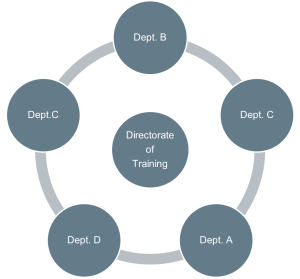
The academy training system.
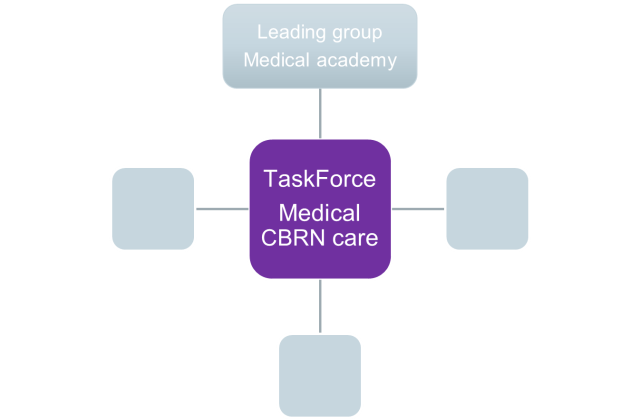
Makeup of the Task Force Medical CBRN Care.
Science and Research
The Directorate of Military Medical Science and Medical Service Capability Development, which constitutes the Medical Academy’s second pillar, was established during the last reorganisation and reorientation of the Academy. It combines and pools expertise and competence in the fields of planning and control of military medical and military pharmaceutical research and development, mission review and knowledge management as well as the command of the CBRN Medical Task Force. As a special technical staff , the Directorate has a wide range of working and functional relationships within the Medical Service and with the six military medical ministerial research institutes, the other major organisational elements, the Federal Ministry of Defence and, in the field of CBRN Medical Defence, also with the Federal Foreign Office and the Federal Ministry of the Interior. Its tasks are essentially the result of the military medical mission of the Bundeswehr Medical Service. Service in the armed forces involves physical and psychological stress and related risks that do not exist in a similar way or to a similar extent in civilian life and thus are not studied. Other risks in an operational environment include potential health damage caused by local environmental influences and infections, weapons eff ects or potential CBRN exposure. As a consequence, military medical research serves to identify any knowledge gaps at an early stage and close them, which is necessary for providing preventive healthcare and medical support at home and on operations. The Directorate plans, coordinates and controls all research and development projects of the Bundeswehr Medical Service. In this context, fields of action are identified by evaluating operations and Bundeswehr routine duty at home. The close interlinkage with the Training and Instruction Directorate described above also allows the direct and immediate incorporation of these results into the training of junior Medical Service personnel at the Medical Academy. The area of responsibility of the Medical Academy also includes technical supervision, operational readiness, training and further development of concepts and material for the CBRN Medical Task Force. Derived from the need to provide the special capabilities of CBRN medical defence continuously and at short notice also during operations abroad, the Science Directorate is in command of personnel from Department F, which forms a command and support group, and military specialists from the three ministerial research institutes. In Germany, this task force in this form – up-to-date regarding the latest developments in science and technology and highly specialised beyond the standardised level – is only available in the Bundeswehr. Operations are strictly mission- and situation-related. Upon activation, its personnel are able to deploy anywhere in the world within 24 to 72 hours. As the only mobile task force of the Federal Republic of Germany, task force teams are therefore also integrated into the crisis response programmes of the International Atomic Energy Agency or the World Health Organization.
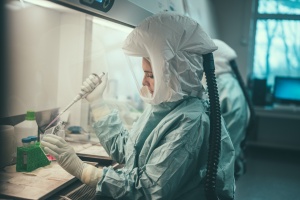
Work at the microbiology institute.
CBRN Medical Defence
The specialist expertise in this area comes mainly from the three ministerial research institutes for CBRN medical defence. The Institutes of Radiobiology, Microbiology and Pharmacology and Toxicology, which are subordinate to the Medical Academy, pool unique capabilities in Munich. These research institutes are highly regarded by experts at the international level, certified, well-established and regularly produce important research contributions that have been used with great success in various civil-military support scenarios in the past. The mission of the Institute of Radiobiology includes studies on diagnostics, therapy, follow-up care and prevention of radiation damage. Some of the Institute’s fields of work touch on politically relevant issues, such as the “handling of enriched uranium as a munition component” and the potential radiation exposure of former Bundeswehr radar operators, but it also makes contributions regarding global crisis situations such as Chernobyl or the atomic bombings in Japan. The Institute of Radiobiology is the only military medical institution represented in the crisis management team of the Federal Ministry for the Environment, Nature Conservation, Nuclear Safety and Consumer Protection and the Institute’s director is also a member of the Federal Commission on Radiological Protection. The Bundeswehr Institute of Microbiology is a federal ministerial research facility for biological medical defence. Its mission is the development of procedures to protect Bundeswehr personnel from diseases caused by biological agents and other dangerous pathogens. Its scientific focus is on a wide range of viruses, bacteria and biological toxins that may threaten military personnel in the theatres of operations or be misused as biological agents. The benefits of such capabilities have been shown impressively during the containment of the Ebola outbreak in West Africa and most recently in the context of the Covid-19 pandemic. Among other things, the Institute was able to diagnose the first case of a SARS-CoV-2 infection in Germany with absolute certainty and to isolate the pathogen in the Institute’s biosafety laboratory. Research at the Institute of Pharmacology and Toxicology focuses on early diagnostics, optimising existing therapy schemes and discovering new active substances that are effective against chemical agents. Chemical toxins and chemical agents have been and are repeatedly used in various countries, most recently in the Syrian civil war in 2013. The Institute’s main focus is on the development of antidotes and therapeutic methods for the treatment of poisoning caused by blister and nerve agents. In addition, the Institute can provide unequivocal evidence of poisoning by chemical agents, as has been impressively demonstrated in the recent past when the Institute verified that Russian opposition leader Navalny was poisoned with the Novichok nerve agent.
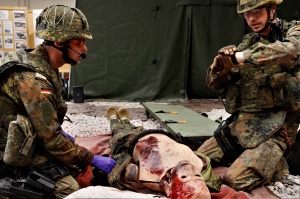
Paramedics training.
Indispensable for the Bundeswehr
The challenges faced by the Medical Academy result primarily from the current political challenges and from changes in the European health care system. Research findings are being translated into basic and follow-on training programmes and new medical applications and technologies at ever shorter intervals. The demands with respect to medical standards and the efficiency of health care provision processes in health facilities are also increasing, as well as military requirements for military personnel. The Commandant of the Medical Academy, Major General (MC) Hans-Ulrich Holtherm, describes this as follows: “This results in higher demands on the capabilities of the health care system and the competences of Bundeswehr medical personnel, in particular with regard to operational tasks within armed forces operating as part of multinational networks. The Medical Academy must also consider the conditions and expectations that future applicants have regarding attractive training and job structures. For the Medical Academy, this would mean improving prerequisites for current and future training and research tasks with regard to personnel, infrastructure and material-technical equipment, expanding cooperation in the field of research and training with national and international partners, intensifying cooperation with the civilian and in particular the academic sectors and enhancing the technical and health science competences of the Bundeswehr Medical Service. The Medical Academy will be an indispensable part of the future mission accomplishment of the Bundeswehr."
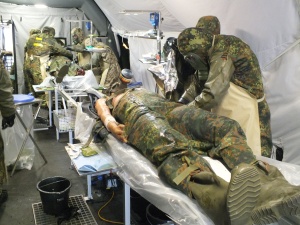
Decontamination training. (source for all images: SanAkBw)
Author: Captain Simon Höpfl
SanAkBw - VII. Insp
VII. Insp/InspFü
Ingolstädter Str. 240, DE 80939 München
Email: [email protected]
Date: 10/11/2023
Source: EMMS - European Military Medical Services 2023








